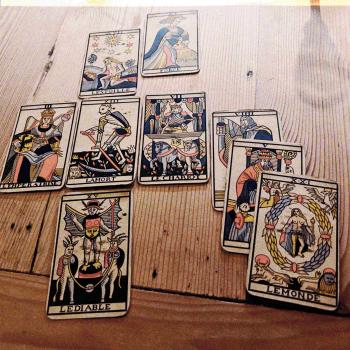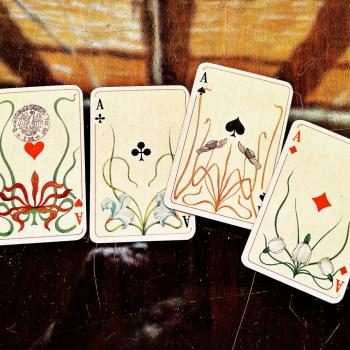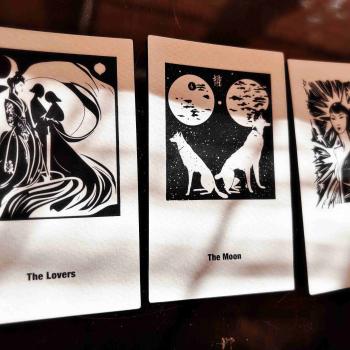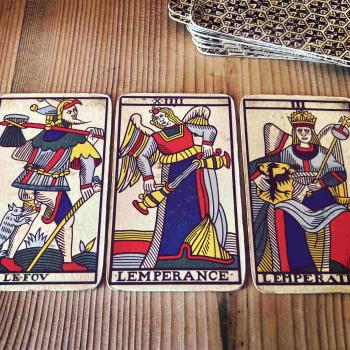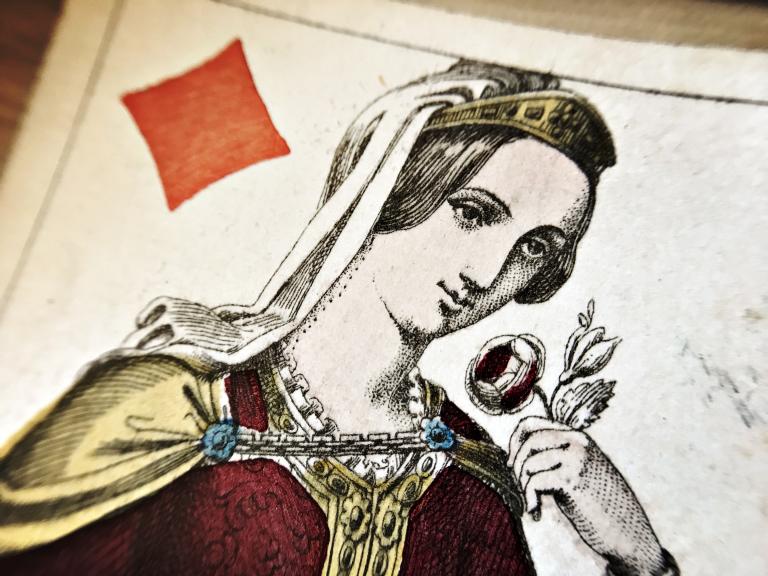
I say to myself not, ‘amazing, this sales person understands me so well’, but I reckon that others do. This week I got several emails that had pretty much the same message in the subject box, one that starts with, ‘Sorry… Camelia, I’m sorry if anyone has ever told you you’re not good enough.’
The funny thing is that these emails came from very different sources, such as an astrology hub, a Buddhist venue, a website platform, and Jesus himself.
Then the line: ‘But I’m here to tell you that you’re loved and you’re wonderful’. Right, now I feel so much better, given the assumption that there’s something to lament about my existence – just imagine the disaster: Someone told me when I grew up that I’m not good enough, and I went to pieces.
I discard the emails that presume to know everything about me, though presuming is more common than we think and it happens all the time in our dealigns with people.
But the thought that befell me was this: If we can’t stay away from the conceit – desire, transformation, magic tool, promised land – we can at least make it more interesting. Sales people could try to change their template more often, by changing their metaphors with ones that don’t always suggest how precious my vulnerability is.
Or better yet, if I were in the ‘coaching the coaches’ business, I’d say this to them: ‘If you have something to sell, just do it, without making all sorts of assumptions, one more hypocritical than the other.’
The truth of the matter is that people are not sorry for what complete strangers go through, and what hardships they endure. How can people be sorry about situations they know nothing of?
I grant it that the sales storyline works: ‘You too can change. I’m Genghis Han and I’ve got just the right horse for you. All you need to do is open your pocket. If you don’t, your entire clan will be abolished.’
But at the same time, I admit that I’d like to see some more nuanced variations of this. I’d like to know how Genghis Han knows about my innermost desire. How does he know I even have one? How does he know that there’s nothing I want more on this planet than the white horse he can give me and instruct me on how to ride straight into the promised land. I’d also like to know more about this place called hell, where he’s ready to send all my kin to, if I dare not give in to my desire. I’d like to know all of this, so that I see for myself if there’s indeed something lamentable about my life, and if there is, why Genghis Han himself and no other is the one to sympathize with me, fix me, tell me how awesome I am, and how loved?
I said it before, if you want peace of mind, stop believing. Start practicing the art of wanting nothing. If you’re bored to death, or suffer from a lamentable situation, try to catch yourself in the act of wanting. How do you react when you slip, when you get caught by the part of your intelligence that agrees with the Buddha: Desire is the root of all mental instability?
‘What of passion,’ you may ask. ‘Isn’t passion the meaning of life, doing what you like and having fun?’ Indeed, it is, if passion is free of desire.
Today I felt like quoting the Bible, since Jesus himself also wants to sell me a story based on the formula: desire, change, magic tool, and promised land.
‘Lead us not into temptation but deliver us from evil.’
Let’s translate this desire to not fall into temptation and be delivered from evil into the language of the cards.
What do they say about our love of fiction and denial? What do they say about taking the path of least resistance, and consequently entrust our lives to sales people who ‘understand’ us so well?
What gives?
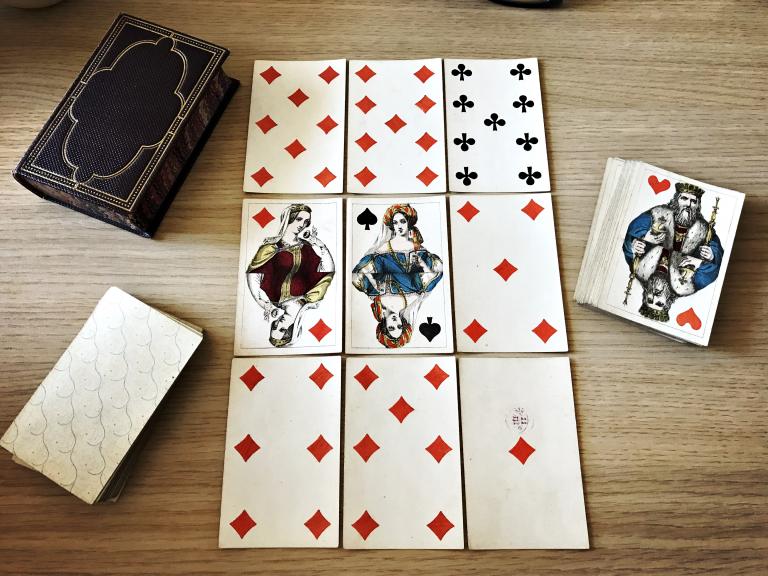
Nine cards on the table. Seven of them diamonds. The world of ideas is shiny. Tales get taller and taller. What’s good for you is to question them. There’s force in what is essentially true.
You can see it, if you want to, the Ace of Diamonds at the bottom tells you. You can get the message, if you look at the building blocks that go into crafting a story. Are you sure you even want anything according to those blocks?
There’s no heart in the 9-card tableau above. The bottom card from the cut deck, the surprise card in the wings, features the King of Hearts. But what has he to say? Other, brilliant conceptual forces are at work. The merchants of the world are good at polishing their craft. Their art of persuasion may hit your emotion, but it’s not of the emotional dimension itself. Know the difference. Good sales people are good at weaving. The wool over your eyes must be thick, your mind filled with inventions and interventions. You must desire the promised land, because everyone else does. You must desire the promised land, or else…
‘Really?’, asks the Queen of Swords. A story is only good for as long as people believe in it. It may be difficult to find a fairytale that can beat Cinderella, ‘you too can wear the magic slipper, and transform into a goddess’. But still. There’s a tradeoff also, of course. You can only get the prince if you listen to the coaching witch. If you don’t, pumpkin time for you, lost opportunity, back to the miserable life. First the desire, then the threat. A winning formula.
I could can go on. What I’m saying is that there are other stories. Ones you can craft yourself. The only magic tool is this one: Mind your business. Don’t ask others about what you should like, or desire, or fear. The promised land is the land where people don’t transact with trust. Hell is where ‘you have to trust people’. Why would you do that? Because they promise you change and transformation, big identity and awesome power? I’m so laughing already. I prefer to treat people by adopting the same, unassuming attitude as when I treat a child. I never think, ‘I wonder if I can trust this 3-year old’.
I read fairytales because they’re entertaining, not because they empower me. I don’t need a story to empower me. I mind my business, and act in accordance with what I see fit. Others may be sorry for me, but somehow that doesn’t move me.
Keep going.
♠
Stay in the loop for cartomantic courses.



